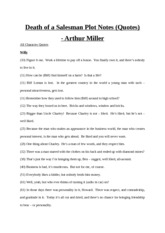

By making these kinds of excuses, it’s almost like Linda is ignoring willy’s problems. For example, Willy says, “I could not drive anymore, the car kept going off onto the shoulder already know? ” Linda replied, “Maybe it’s your glasses” (Miller 22). You can refer to her actions as being loyal but She could have tried and helped Willy get better, but instead, she just brushed everything off and made it look like Willy’s behavior was normal and always makes excuses for Willy. She never questions her husband and is always beside him, she never fails to agree with him. However, this lifestyle of hers ultimately leads to the downfall of her husband. In the play, Death of a Salesman, the ‘American Dream’ is.

This idea was known as the ‘American Dream. The catastrophic events caused millions to start over and this new beginning meant much more for select American individuals. Linda behaves as the “perfect” wife would in that time. Death of a Salesman takes place almost a decade after one of the worst economic crises, The Great Depression.
/uk--the-royal-shakespeare-company-s-production-of-arthur-miller-s-death-of-a-salesman-at-the-royal-shakespeare-theatre-i-541776130-5aa03cbec064710037d72f0d.jpg)
Willy has problems with his memory, but Linda is always making excuses for Willy’s mistakes. MonkeyNotes Study Guides Download Store-Downloadable Study Guides/Book Summary,Book Notes,Notes,Chapter Summary/Synopsis. Linda enables her husband Willy to live in his fantasy world because she knows that the truth would bring nothing but hurt to him and their family, so she decides to hide the truth. There are many examples throughout the play that reveals that Linda is the classic enabler who indirectly causes the dysfunction in the Loman household. This is directly indicated by her behavior, the way she hides her feelings, and the way she treats her sons. Her character shows the typical American wife of that era. The character Linda Loman, who plays the role of Willy Loman’s wife, in Arthur Miller’s play, Death of a Salesman is a very important part in the play.


 0 kommentar(er)
0 kommentar(er)
